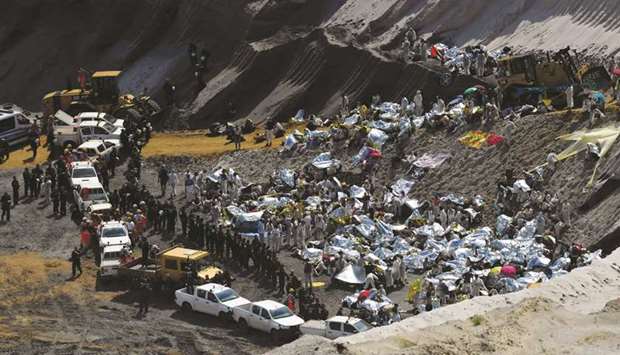Hundreds of climate activists broke through a police line and stormed the Garzweiler lignite mine in western Germany yesterday in a protest against coal mining and demanding action against climate change.
Police from nearby Aachen reported that officers were injured in the action and appealed for calm, warning that the mine was dangerous and even life-threatening.
Police would not confirm how many people had entered the mine, but said there would now be an attempt to negotiate.
A spokeswoman for the activists estimated their numbers at 1,000.
The action was organised by the so-called “Ende Gelaende” group, which describes itself as a civil disobedience protest movement to limit global warming through fossil fuel phase-out.
“Ende Gelaende” translates roughly to “end of story” or “time is up”.
Some 8,000 demonstrators began a march early yesterday from Keyenberg along the edge of the mine.
That protest was peaceful, including students of the “Fridays for Future” protests against climate change, as well as families and older protesters.
But Ende Gelaende led a separate march of some 1,600 people and earlier in the day had promised to “stream through” the police line in a statement around noon on Twitter.
The activists, many dressed in white overalls and carrying sleeping bags, got into the vast Garzweiler lignite mine after a cat-and-mouse game with police, an AFP journalist said.
They ignored earlier police warnings that the site was not safe and a caution from RWE that they would prosecute trespassers.
The activists, using blankets to protect against the sun, were quickly encircled by police and their vehicles to prevent them advancing further.
“Our colleagues here were approached by the masses and partially injured,” Aachen police said on Twitter.
The police press office would not offer details on the number or extent of the injuries, but a local police union reported two injured.
It is presumed that they fell during the run on the mine.
Police used pepper spray to try to stop the activists.
Ende Gelaende on their Twitter feed spoke of “police violence”.
Michael Mertens, head of the police union for North-Rhine Westphalia, accused the activists of “unbelievable carelessness”. The edge of the mine was dangerous because the ground was unstable and not easily visible.
“You can plunge 40m,” he told DPA.
Mertens predicted a “long day” for police as the move by activists was not likely to be a one-time action.
At the same time, he praised the peaceful march of “Fridays for Future” protesters.
Four out of six production units of the mine, which is Germany’s largest, were shut down for security reasons by the owner, energy giant RWE, according to a spokesman for the company.
“This is an intrusion into public utility infrastructure,” the RWE spokesman said, but added that the company did not expect to have to shutter any power plants for the time being.
Since late on Friday, some 800 protesters have also been blocking train tracks in the region that usually serve as a coal transport route to the Neurath lignite-fired power plant.
A separate train line in Hambach, also used for coal, was also blocked.
Activist spokeswoman Kathrin Henneberger estimated more than 6,000 of the group were active in the area. “We have blocked many points. With that we have sent a clear signal: Something to protect the climate needs to happen now.”
Garzweiler, which covers 48sq km (18sq miles), supplies lignite, or brown coal, to power stations in the region.
A few kilometres from Garzweiler, some 8,000 people protested yesterday in the town of Keyenberg, which is threatened by plans to expand the mine.
“This day is a reason to hope,” said Kathrin Henneberger. “Despite the unprecedented failure of the politicians faced with the climate crisis, thousands of people are today sending a clear signal for climate justice.
“Whether it is a demonstration, a school strike or a blockade, this movement is determined to put an end to the era of fossil fuels,” she added.
The “Fridays for Future” protest network is driven largely by schoolchildren and led by Sweden’s Greta Thunberg.
Her weekly protest outside parliament in Stockholm culminated in a May 24 global school strike that was staged in 131 countries.

Climate activists use blankets to protect against the sun after entering the grounds of the Garzweiler brown coal mine in Garzweiler, western Germany.
